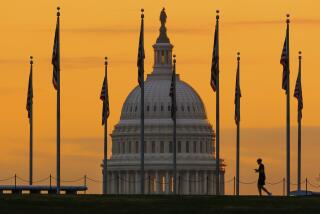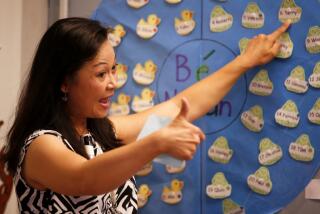Poll Finds Gap in Views of Professors, Mainstream
- Share via
Who is teaching our teachers? And what do they teach them?
Public Agenda, a nonpartisan, education-oriented public opinion research group in New York, polled 900 professors in the nation’s schools of education and found an “often staggering” disconnect between what education professors value and what most parents, teachers and even students say they need.
The education professors, for example, place discipline at the bottom of their list--along with teaching students basics such as grammar and the importance of neatness, punctuality and manners. That’s the opposite of what parents and teachers have valued in similar polls.
A majority of the professors agree that early use of calculators improves children’s problem-solving skills--in contrast to teachers and the public, who overwhelmingly believe that students should perform math by hand before leaning on technological aids.
The professors also valued process over content, saying it was more important for students to “learn how to learn” than know the right answer.
The findings--released Tuesday--may turn up the heat in the debate over the quality and purpose of public schools, particularly as the debate focuses on the quality of the college and university programs that train the nation’s teaching corps.
Education professors are, perhaps more than any other group, responsible for defining what education is or should be, said Public Agenda Executive Director Deborah Wadsworth.
But the education professoriate appears to be guilty of “a type of rarefied blindness, given the public’s concerns about school safety and discipline and whether high school graduates have even basic skills,” Wadsworth said.
While strong in their beliefs, the professors also were insecure about whether they are adequately preparing teachers to succeed in the classroom. The poll found that while most of the education professors had been classroom teachers at one time, that “real-world” experience for the most part was more than 10 years old.
The poll’s major findings stirred mixed reactions in education schools. Arthur Levine, president of Teachers College, Columbia University, agreed that too many programs are removed from real-world concerns. “They are to be kicked for that,” he said.
But Carolyn Ellner, education dean at Cal State Northridge--one of the state’s largest producers of teachers--said the study set up “false dichotomies.”
“Some of the things the public thinks are important, like discipline and punctuality, are really motivational factors,” said Ellner, who also chairs the state Commission on Teacher Credentialing. “They are the byproduct of a rich learning environment.”
The poll, funded by the Thomas B. Fordham Foundation and conducted between July and September, included focus groups of teacher educators in New York, Chicago, Boston and Los Angeles. Researchers said the California professors mirrored their colleagues around the country, except that they expressed more concern about teacher quality and “great angst” about the pressure to supply more teachers to fill the smaller classes being created in the state’s lower grades.
Among the major findings:
* More than eight in 10 professors believe it is “absolutely essential” to teach prospective teachers the importance of being lifelong learners. But barely four in 10 said maintaining discipline and order was essential. Fewer than two in 10 stressed such basics as spelling and grammar. And only 12% said it was essential to expect students to be neat, on time and polite.
* More than eight in 10 professors said that in teaching subjects such as math or history, it is more important that students struggle with the process of trying to find the right answers. Only 12% said it was more important that kids end up knowing the right answer.
* About six in 10 professors said young children would benefit from using calculators. Earlier polls by Public Agenda found that 86% of the public and 73% of teachers want students to memorize math facts and do math problems by hand before turning to calculators.
* More than eight in 10 of the professors said they worry that they are too far removed from the realities of the classroom and believe they should spend more time inside public schools.
Some of the poll’s findings also suggested that education professors’ beliefs in certain teaching methods may be based more on ideology than research.
Professors who described themselves as conservative were far more likely than liberals--82% to 44%--to support the notion that public schools should be more concerned with teaching new immigrants America’s language and culture than helping to maintain their native ones.
(BEGIN TEXT OF INFOBOX / INFOGRAPHIC)
Professor’s Priorities
Percentage of education professors who said it is essential to encourage these attitudes and methods among prospective teachers:
* Expecting students to be neat, on time, polite: 12%* Stressing correct spelling, grammar, punctuation: 19%
* Maintaining discipline and order in the classroom: 37%
* Being lifelong learners constantly updating skills: 84%
Source: Public Agenda interviews with 900 professors of education. Margin of error is plus or minus 3 percentage points.
More to Read
Sign up for Essential California
The most important California stories and recommendations in your inbox every morning.
You may occasionally receive promotional content from the Los Angeles Times.














